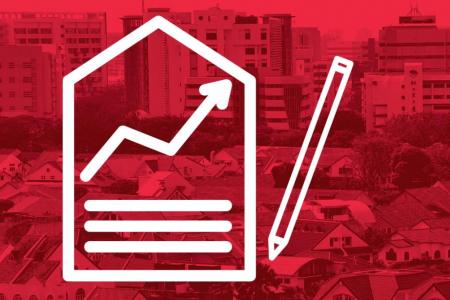Expert: Now may be time to switch to a fixed mortgage
With US Fed's move, home loan interest rates are expected to rise over next 12 months
The US Federal Reserve raised a key interest rate for the first time this year on Wednesday, and indicated another three increases next year, one more than originally projected.
The more aggressive approach in 2017 signals the Fed's confidence in the US economy's recovery, with President-elect Donald Trump expected to increase spending.
While this could help stimulate global growth, Singapore businesses and consumers can expect more belt-tightening in the coming year.
The Fed's move will push up borrowing costs here amid forecasts of lacklustre economic growth.
Among those who will feel the pinch are home owners with mortgages, as interest rates are expected to spike.
After the Fed raised the benchmark federal funds rate by a quarter of a percentage point to 0.75 per cent, the three-month Sibor rose to 0.93209 per cent, up 6.7 per cent from Nov 11, and the highest since July, reported The Straits Times.
The Sibor, or Singapore interbank offered rate, is used to price home loans and is typically highly correlated with US interest rates.
CBRE's research head for Singapore and South-east Asia, Mr Desmond Sim, told The New Paper yesterday that risk-averse home owners could consider switching from a floating-rate loan, such as those tied to Sibor, to one with fixed rates.
"This is because we are experiencing a rising interest rate environment.
"Fixed rates give more stability but are higher than floating rates because banks absorb the risk," he said.
But Mr Sim does not think there will a rush to buy property on loans with fixed interest rates that are locked in for a few years.
"With the Fed hike, interest rates are expected to rise over the next 12 months. But the last thing we need is a knee-jerk reaction.
"The key point is that initial reaction will be minimal because more credit bureaus stress-test buyers at a long-term average of 3 per cent to 3.5 per cent.
"There will be no rush of people wanting to buy or sell properties. But the increase in interest rates may affect sales."
Experts told TNP that while the strengthening greenback - on the back of the rate hike - may boost exports, consumers here will be hit when travelling to or studying in the US.
Online shoppers may also want to avoid websites that deal in US dollars.
CIMB Private Bank economist Song Seng Wun suggested Singapore tourists could avoid the US and instead go to Europe or countries in the region.
OCBC senior investment strategist Vasu Menon said: "Students on a tight budget or scholarship may find it harder to cope with the rising costs."
Get The New Paper on your phone with the free TNP app. Download from the Apple App Store or Google Play Store now


